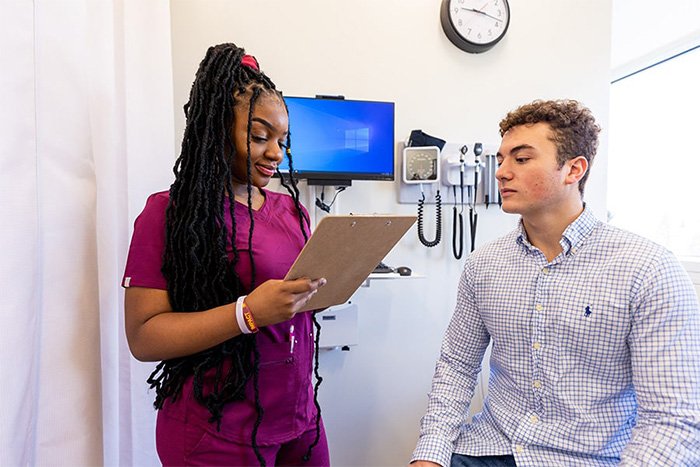RN to BSN Program Mission and Goals



College mission, vision and values
Mission
Through The Herbert H. and Grace A. Dow College of Health Professions, we foster and sustain a culture of excellence through collaborative clinical/professional practice, learner-centered education, leadership, research, and service.
Vision
The Herbert H. and Grace A. Dow College of Health Professions is to be nationally recognized for the development of professionals who contribute to an inclusive, healthy society.
Values
To achieve our mission we adhere to the core values of integrity, respect, compassion, inclusiveness, social responsibility, excellence, and innovation.
RN-to-BSN program mission
The mission of the RN-to-BSN program is to create a culture of excellence that promotes the personal and professional growth of students to become nursing leaders through systems thinking, research, and service.
The RN-to-BSN program recognizes the unique characteristics and needs of our diverse, primarily rural setting, preparing graduates to provide nursing care to individuals, families, groups, communities, and populations in a variety of settings.
Program graduates demonstrate competence in clinical judgment, collaborate as members and leaders of interprofessional healthcare teams, and utilize evidence-based interventions to manage illness; promote, maintain, and restore health across the lifespan.
RN-to-BSN program goals
- Provide graduates with a strong foundation in nursing leadership, evidence-based practice, systems thinking, and population health to meet the demands of health care employers.
- Build upon a foundation of the arts, sciences, and humanities and professional nursing education that provide a base for our graduates' eligibility for graduate degree education to prepare for advanced nursing practice roles.
- Implement innovative and accessible models of nursing education to meet the personal and professional needs of an increasingly diverse student body.
- Recruit and retain qualified and diverse students committed to academic excellence, professional development, and lifelong learning.
- Recruit and retain qualified faculty who contribute to the university, the profession, and service and scholarly endeavors.
Alignment of RN-to-BSN student learning objectives with BSN essentials and QSEN competencies
Our RN-to-BSN program builds an intellectual framework that reflects two major bodies of knowledge and scholarship: the BSN Essentials and the Quality and Safety Education for Nurses (QSEN) Competencies. The table below illustrates the alignment of the program's student learning objectives (SLO) with selected BSN Essentials and QSEN Competencies.
| Program SLO | BSN Essential | QSEN Competency |
|---|---|---|
| Integrate knowledge from the liberal arts, sciences, and nursing to provide culturally competent nursing care for diverse populations. | Essential I: Liberal Education for Baccalaureate Generalist Nursing Practice Essential VIII: Professionalism and Professional Values Essential IX: Baccalaureate Generalist Nursing Practice | Patient-Centered Care: Recognize the patient or designee as the source of control and full partner in providing compassionate and coordinated care based on respect for the patient's preferences, values, and needs. |
| Demonstrate nursing leadership principles to plan and implement patient safety and quality improvement initiatives within the context of a dynamic complex health care system and inter-professional care. | Essential II: Basic Organizational and Systems Leadership for Quality care and patient Safety Essential VI: Inter-professional Communication and Collaboration for Improving Patient Health Outcomes | Teamwork and Collaboration: Function effectively within nursing and inter-professional teams, fostering open communication, mutual respect, and shared decision-making to achieve quality patient care. Safety: Minimize risk of harm to patients and providers through both system effectiveness and individual performance. |
| Apply concepts of global health to plan appropriate culturally-safe care and health promotion for vulnerable populations. | Essential VII: Clinical Prevention and Population Health | Patient-Centered Care: Recognize the patient or designee as the source of control and full partner in providing compassionate and coordinated care based on respect for patient's preferences, values, and needs. Safety: Minimize risk of harm to patients and providers through both system effectiveness and individual performance. |
| Utilize best current evidence and systems thinking to improve nursing and health care practices for groups or populations. | Essential III: Scholarship for Evidence-Based Practice Essential IV: Information Management and Application of Patient Care Technology | Evidence-Based Practice: Integrate best current evidence with clinical expertise and patient/family preferences and values for delivery of optimal health care. Quality Improvement: Use data to monitor the outcomes of care processes and use improvement methods to design and test changes to continuously improve the quality and safety of health care systems. Informatics: Use information and technology to communicate, manage knowledge, mitigate error, and support decision-making. |
| Incorporate concepts of inter-professional collaboration and communication, health policy, finance, and regulatory environments as leaders in nursing practice. | Essential V: Healthcare Policy, Finance, and Regulatory Environments Essential VIII: Professionalism and Professional Values | Teamwork and Collaboration: Function effectively within nursing and inter-professional teams, fostering open communication, mutual respect, and shared decision-making to achieve quality patient care. |